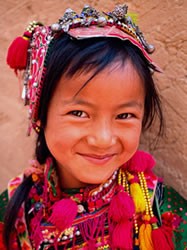Nosu, Shengzha in China

Photo Source:
Copyrighted © 2026
Anonymous All rights reserved. Used with permission |
Send Joshua Project a map of this people group.
|
| People Name: | Nosu, Shengzha |
| Country: | China |
| 10/40 Window: | Yes |
| Population: | 1,319,000 |
| World Population: | 1,319,000 |
| Primary Language: | Nuosu |
| Primary Religion: | Ethnic Religions |
| Christian Adherents: | 2.00 % |
| Evangelicals: | 1.40 % |
| Scripture: | New Testament |
| Ministry Resources: | Yes |
| Jesus Film: | Yes |
| Audio Recordings: | Yes |
| People Cluster: | Nosu |
| Affinity Bloc: | Tibetan-Himalayan Peoples |
| Progress Level: |
|
Introduction / History
Nosu history is one of violence and interclan warfare. For centuries the Nosu raided villages and took slaves, forcing them to do manual labor. One missionary noted, "In retaliation for the taking of slaves, it was not uncommon in the 1940s to see Chinese soldiers walking through city streets carrying on their backs large baskets filled with Nosu heads, still dripping with blood." The Nosu region, in 1956, was the last part of China to come under communist rule. In the violent clashes ten Chinese troops were killed for every Nosu, earning the Nosu the nickname, "Iron Peas." Since the collapse of the slave system, the class structure among the Nosu has weakened. Today even the former Bai Yi slaves "tease and mock [the Nosu] ... who are mockingly called princes and princesses."
The name Nosu means "black people." Many early travelers who came into contact with the Nosu remarked on the beauty and Caucasian features of the Nosu women. One described them as "a black branch of the Caucasian race." The Daliangshan area has a great level of ethnic complexity. A 1983 official government report seems to lament "44 Nosu subgroups with different self-designations and obscure dialects." Another publication written by Chinese scholars mentions "more than 100 patriarchal clans in the Daliangshan alone, ... independent of each other and with their own area of jurisdiction."
What Are Their Lives Like?
Early literature on the Nosu called them Lolo, in reference to the small basket they carried around with them which supposedly contained the souls of their dead ancestors.
What Are Their Beliefs?
The Shengzha Nosu believe in Mo'm Apu, a supreme creator spirit who controls the universe. His son, Gee Nyo, gives rain, prosperity and happiness.
An oral tradition in Nosu culture: "Some of the No-su, but not all of them, have a legend of the Creation, but all of them have a legend of the Flood. They manifestly trace their genealogy from Noah. They say a certain man had three sons. He received warning that a flood was to come upon the earth, and the family discussed how they should save themselves when this calamity came upon them. One suggested an iron cupboard, another a stone one, but the suggestion of the third that they should make a cupboard of wood and store it with food was acted upon. Thus the family was saved; but they say nothing about animals."
Mission work among the Shengzha Nosu began in the late 1800s but resulted in few conversions. In the mid-1940s China Inland Mission worker James Broomhall tried to mobilize Yi Christians from Yunnan to evangelize the Nosu, but they could not adjust to the differences in language and culture. After more than a century of labor and prayer, a breakthrough occurred in 1996 when Nosu leaders of the Mentu Hui cult heard and believed the gospel. They publicly renounced the cult and by mid-1997 had led 12,000 Shengzha Nosu to faith in Christ.
What Are Their Needs?
These people need to accept the warm embrace of the only savior so they can enjoy spiritually meaningful lives.
Prayer Points
Pray that this people's traditions of a Creator God and a flood will lead them to Christ.
Pray for revival and outreach among believers.
Pray for the Lord to intervene in their families, calling people to his side.
Pray for their hearts to be drawn to the Lord of lords.
Pray for a church planting movement to thrive in their communities.